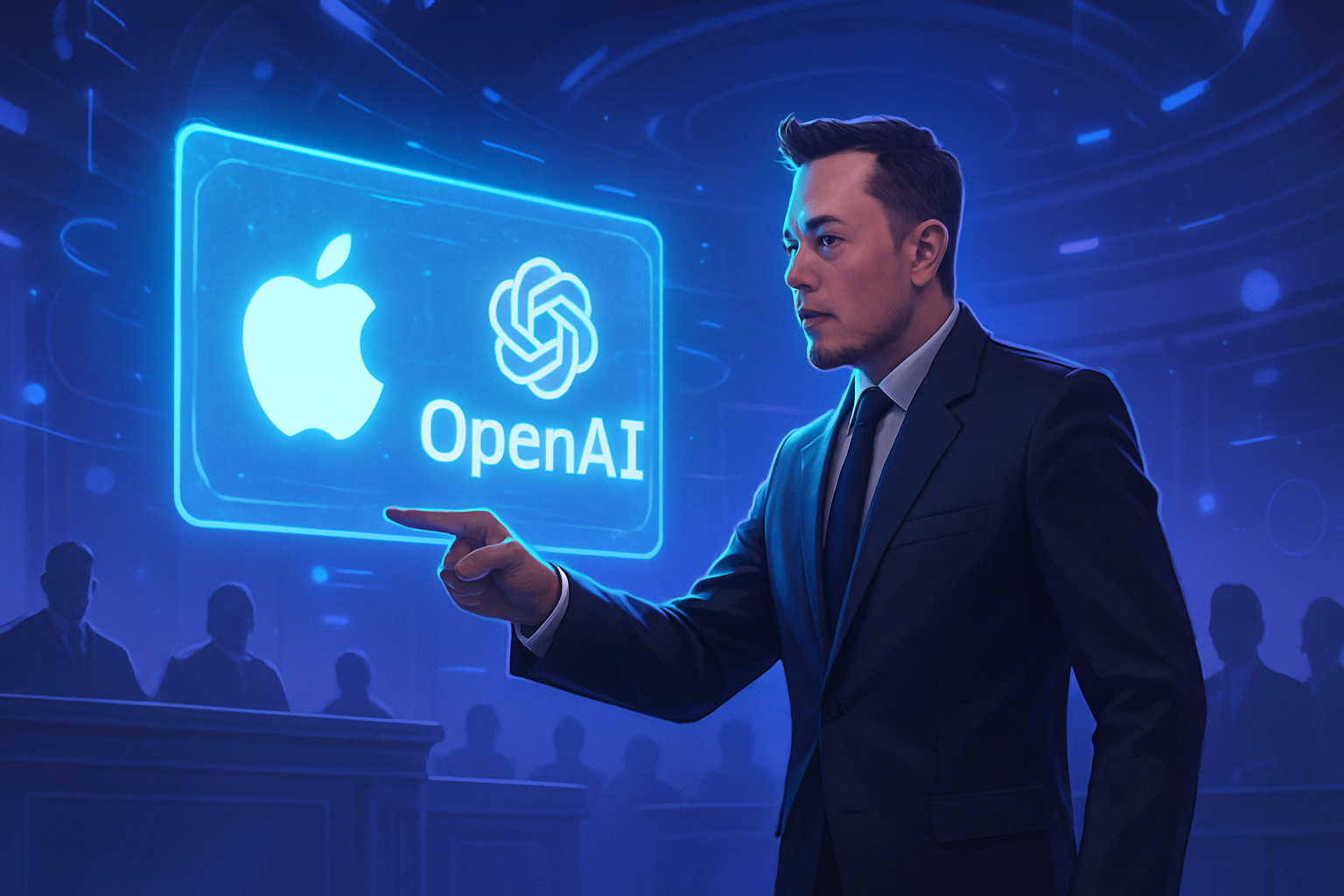Elon Musk, an emblematic figure of technological innovation, is launching a legal offensive against Apple and OpenAI, accusing them of anticompetitive practices. This lawsuit, filed on August 25 in Texas, denounces an alleged illegal alliance aimed at stifling competition in the sector of artificial intelligence. *Labyrinthine* and *fierce*, this battle is characterized by colossal commercial stakes and fervent personal rivalries.
Monopoly on AI at risk. Musk’s companies, X and xAI, are demanding several billion dollars in damages. Allegations of manipulation on the App Store. The repercussions of this conflict could redefine the dynamics of the tech market. An unprecedented showdown. A new chapter is being written in the book of power struggles in Silicon Valley.
Context of the lawsuit
Elon Musk has filed a lawsuit against Apple and OpenAI for anticompetitive practices, revealing allegations of illegal collaboration between the two companies. This trial was submitted to a federal court in Texas on August 25.
Musk’s companies, X and xAI, accuse Apple and OpenAI of forming an alliance to hinder competition in the field of generative artificial intelligence on smartphones.
Specific allegations
The complaint alleges that the two giants have agreed to integrate the AI assistant of ChatGPT into Apple smartphones. This collaboration, according to Musk, excludes rivals like Grok, the AI assistant developed by xAI.
The legal document establishes a striking analogy, describing this situation as “the story of two monopolies” seeking to reinforce their dominance in an AI-focused technological landscape.
Impact on the market
X and xAI claim that Apple holds about 65% of the market for smartphones in the United States and that OpenAI controls nearly 80% of the generative AI assistant sector. This monopoly would give ChatGPT privileged access to “billions of user queries” from hundreds of millions of devices.
Ranking manipulation
Another allegation concerns Apple’s manipulation of app rankings on its App Store, thereby favoring ChatGPT over Grok. Musk claims that the company is also delaying the approval of updates for its own AI assistant.
Legal demands
Musk’s companies are seeking damages amounting to several billion dollars as well as a permanent injunction against the practices deemed anticompetitive. A jury trial is also requested, reflecting the seriousness of the accusations against Apple and OpenAI.
Company responses
A spokesperson for OpenAI described this lawsuit as a *ruthless campaign* by Musk, aiming to damage the company’s reputation. Apple, for its part, has not yet issued an official response to this recent accusation.
History of the Musk-OpenAI relationship
Elon Musk was one of the co-founders of OpenAI in 2015. However, his departure from the company in 2018 was followed by a series of attacks through public statements and lawsuits, after the remarkable success of ChatGPT at the end of 2022.
Conflicts with Sam Altman
The conflict between Musk and Sam Altman, co-founder and CEO of OpenAI, has marred this affair. Altman has challenged Musk’s accusations, accusing him of using X for his own interests and harming competitors.
In response, Musk called Altman a *liar* and mocked his arguments as “nonsense.”
Criticism of the App Store model
Criticism of Apple regarding its App Store is not limited to Elon Musk. Other companies and authorities, notably Epic Games, denounce a duopoly between Apple and Google that harms competition. These entities assert that Apple and Google’s policies abuse their dominant position in the mobile app market.
Recent judgments have also indicated that Apple can no longer force app publishers to go through its App Store and payment system.
Perspectives on artificial intelligence
The current situation raises concerns about the future of artificial intelligence and how major companies interact in the market. These events occur in a climate of growing opposition to AI, which is also supported by legal actions against OpenAI. For more information on the lawsuits, check out this relevant article here.
The implications of this case appear complex and indicate a need to evaluate business practices in the tech sector, especially when companies position themselves as leaders. Other media, such as the largest Canadian media outlets, are launching lawsuits against OpenAI, marking an escalation of tensions in the field. Check the details here.
Common questions about Elon Musk’s lawsuit against Apple and OpenAI
Why does Elon Musk accuse Apple and OpenAI of illegal alliance?
Elon Musk claims that the two companies have formed an alliance to hinder competition in the generative artificial intelligence market, particularly by integrating the AI assistant of ChatGPT on Apple devices while imposing restrictions on competitors like Grok, xAI’s assistant.
What is the aim of the lawsuit filed by Elon Musk?
The lawsuit seeks several billion dollars in damages and a permanent injunction to end the alleged anticompetitive practices of Apple and OpenAI.
What evidence does Elon Musk present to support his accusations?
In his complaint, Musk mentions Apple’s control of 65% of the smartphone market in the U.S. and OpenAI’s dominance, which holds at least 80% of the generative AI assistants market, which he claims constitutes a concentration of power harmful to competition.
How have Apple and OpenAI responded to Elon Musk’s accusations?
OpenAI responded by describing Musk’s accusations as a “ruthless campaign” to harm him and pointed out that Musk sometimes manipulates social network X for his own interests. Apple also defended the objectivity of its App Store in a statement.
What are the potential implications of this lawsuit for the AI industry?
If the lawsuit succeeds, it could challenge the alliance and competition practices within the AI industry, prompting other companies to reconsider their partnerships and comply with stricter competition standards.
Did Elon Musk have a role in the creation of OpenAI?
Yes, Elon Musk was one of the co-founders of OpenAI in 2015, but he left the company in 2018 and has since criticized its leadership and practices.
What legal remedies are possible after this lawsuit?
Legal remedies may include monetary damages and injunctions to stop anticompetitive behavior, as well as modifications of agreements between the companies involved to promote fair competition in the market.






